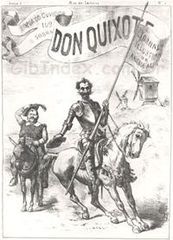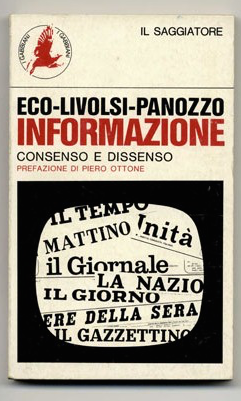We don’t often think about where a particular novelist or poet was when she or he wrote a well-known work. When we do, most of us are unlikely to imagine the confines of a prison cell. However, many canonical works of fiction, as well as significant twentieth-century political texts, were drafted while their writers were incarcerated. In some cases, the texts directly address the writer’s imprisonment, while in others, the claustrophobic walls of a prison cell appear to have enabled the imaginative capacities of the novelist.
Miguel de Cervantes’s Don Quixote (1605-1615)
 It’s not exactly clear whether or not Miguel de Cervantes began working on his famous novel Don Quixote while in prison, but the prologue to the first part of the novel insists that it was “begotten in a prison, where every discomfort has its place and every sad sound makes its home.” It’s likely that Cervantes’s assertion refers to the year he spent in prison for tax-related offenses in Seville, yet as John Rutherford explains in the “Introduction” to the 2003 translation of the novel, “Nobody knows whether he started writing while in prison, or later.”
It’s not exactly clear whether or not Miguel de Cervantes began working on his famous novel Don Quixote while in prison, but the prologue to the first part of the novel insists that it was “begotten in a prison, where every discomfort has its place and every sad sound makes its home.” It’s likely that Cervantes’s assertion refers to the year he spent in prison for tax-related offenses in Seville, yet as John Rutherford explains in the “Introduction” to the 2003 translation of the novel, “Nobody knows whether he started writing while in prison, or later.”
Regardless, Cervantes’s novel doesn’t depict the conditions of imprisonment, or even allude in most respects to social conditions—at least in realist terms—at all. Instead, the novel begins with an introduction to the fanciful world of Don Quixote who, “during his idle moments (which accounted for most of the year) . . . took to reading books of chivalry with such relish and enthusiasm that he almost forgot about his hunting and even running his property, and his foolish curiosity reached such extremes that he sold acres of arable land to buy these books of chivalry, and took home as many of them as he could find . . .”
Antonio Gramsci’s Prison Notebooks (1926-1935)
 As the title given to these writings suggests, the materials contained in Antonio Gramsci’s Prison Notebooks were written when the Marxist thinker and political theorist was imprisoned by Mussolini’s Italian Facsist regime in the 1920s. Gramsci was imprisoned from 1926-1935 at Turi de Bari, and he died only two years after his release. When a new translation of the complete Prison Notebooks was published in 2011 by Columbia University Press, postcolonial scholar Gayatri Chakravorty Spivak praised the new and accessible publication of the work: “Now Buttigieg’s [the translator and editor] monumental and magisterial work is available in paperback. Scholars, teachers, students, activists, general readers—rejoice!”
As the title given to these writings suggests, the materials contained in Antonio Gramsci’s Prison Notebooks were written when the Marxist thinker and political theorist was imprisoned by Mussolini’s Italian Facsist regime in the 1920s. Gramsci was imprisoned from 1926-1935 at Turi de Bari, and he died only two years after his release. When a new translation of the complete Prison Notebooks was published in 2011 by Columbia University Press, postcolonial scholar Gayatri Chakravorty Spivak praised the new and accessible publication of the work: “Now Buttigieg’s [the translator and editor] monumental and magisterial work is available in paperback. Scholars, teachers, students, activists, general readers—rejoice!”
Martin Luther King, Jr., Letter from a Birmingham Jail (1963)
In 1963, Martin Luther King, Jr. was arrested for peacefully protesting discrimination against African American citizens in Birmingham, Alabama. While in jail, he wrote one of the most significant texts of the Civil Rights movement:
“My Dear Fellow Clergymen:
While confined here in the Birmingham city jail, I came across your recent statement calling my present activities ‘unwise and untimely.’ Seldom do I pause to answer criticism of my work and ideas. If I sought to answer all the criticisms that cross my desk, my secretaries would have little time for anything other than such correspondence in the course of the day, and I would have no time for constructive work. But since I feel that you are men of genuine good will and that your criticisms are sincerely set forth, I want to try to answer your statement in what I hope will be patient and reasonable terms . . . .
. . . . I am in Birmingham because injustice is here . . . . I cannot sit idly by in Atlanta and not be concerned about what happens in Birmingham. Injustice anywhere is a threat to justice everywhere.”
If you’re interested in reading the letter in full, you can pick up a hardcopy edition. The letter has been published numerous times since King wrote it in 1963, and in 1994 HarperCollins published a hardcover edition with an introduction by Bernice A. King, the youngest daughter of Martin Luther King, Jr.and his wife, Coretta Scott King.
Exploring More Literature Written from Prison
The titles we’ve listed here are only a few examples of some famous texts written from behind imprisoning walls. If you’re looking for additional works, we recommend Malcolm Braly’s On the Yard (1967), a novel that starkly addresses the conditions of the American penitentiary that Kurt Vonnegut described as “[s]urely the great American prison novel.” Or, if you’re interested in moving beyond U.S. literature, why not seek out Aleksandr Solzhenitsyn’s poetry written during his period of imprisonment in the Soviet Union? There are many examples of literature written from prison, as well as texts that allude to their authors’ confinement. After reading the titles we’ve mentioned here, we invite you to continue exploring the similarities and differences among authors imprisoned by various political regimes and during a variety of geopolitical moments.









